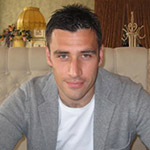“The only people who absolutely shouldn’t try to become dealers are the seriously camera-shy.” — Interview with Product Owner – Live Casino at Pateplay, Eugene Camilleri

We continue our series of interviews with prominent figures in the world of gambling, and our guest today is Product Owner – Live Casino at Pateplay Eugene Camilleri. He kindly agreed to answer our questions and shared plenty of interesting aspects about one of the most critical issues in the industry.
Eugene will tell us about live casinos — how to develop a really good game, what types of games are more popular in different markets, what qualities you need to be a good dealer, and who shouldn’t even try. We will also find out why dealers don’t cheat.
Learn about this and much more with our today’s guest.
— Introduce yourself, please, and tell us about yourself. What do you like most about iGaming?
— My name is Eugene Camilleri, I’m 28 years old, and I grew up in Malta, a small yet significant island smack-dab in the middle of the Mediterranean — often referred to by locals as “The Rock” (perhaps a testament to our world-shaping history as a hardy people). You may have heard of it due to its favorable tax status that drove a wave of online gambling and fintech companies to settle there in the late 2000s and early 2010s.
Honestly, I very much ended up in this industry by a very happy accident, and I have not looked back — practically since day one. The online gambling industry is young and rapidly growing, a combination that provides career growth opportunities, the likes of which are only dreamt of in the more “traditional” industries. And this attracts young and driven people, which in turn, creates the “work hard, play hard’” attitude that gives this industry the constant thrill that keeps us coming to work with a smile on our faces.
— Tell us about your duties at Pateplay.
— My duties are threefold:
- I direct the concept stage of each of the projects in the Live Casino division.
- I work closely with Project Managers, equipment constructors, and a whole roster of third parties to ensure every aspect of the division’s overall development is in line with company goals and the roadmap.
- I draw on my experience in studio operations to build an operational team of game presenters, show hosts, and various managers to run the studio’s day-to-day once it goes live.
Throughout my career, I have been blessed with the opportunity to work in every aspect of business, and all this has culminated in the future success of this new venture.
— On your Linkedin page, you wrote about the instrumental role in developing the next generation of Casino products. What next generation of casino products are we talking about?
— Well, I would hardly have a competitive edge if I answered this question so early in the development stage, would I? All I can say is that myself and my colleagues want to do things differently, and if everything goes according to plan, the picture it would take me a few thousand words to paint shall be ready shortly.
— Is it hard for a Bulgarian startup to compete with such major brands as Evolution and Pragmatic Play?
— Competing with industry giants is never easy. Due to economies of scale, they tend to have entire departments to do a job which some startups have to bundle with two other jobs and hand off to one person. The sheer number of tables opened by these companies means they can cater to almost every player’s needs through one product or another, and their influence alone tends to land them very favorable spots on most operators’ sites.
My advice for anyone trying is simple: create a product that stands out. You have to offer something new and exciting enough to balance out the trust and brand loyalty that is extended to the industry giants. Most online casinos in the world seem to have “Just copy what Evolution is doing” as their mission statement. I am by no means saying Evolution Gaming’s business model or studio setup is a bad one — they are where they are for a reason. But if your product looks exactly like theirs, with a few different bells and whistles attached, then you have no competitive advantage and will always be seen as a cheap imitation. This is evident from the swarm of “Crazy Time” clones that providers have been pushing forward since Evolution dropped theirs. The clones have similar mechanics, similar RTPs, and similar hosting styles. And still, most of them struggle to reach 10% of the original’s active player cap.

— Let’s imagine that some studio decided that it wants to start, for example, roulette with live dealers. What do you have to do to release it, so people start playing?
— The first step would be to determine the audience and the “feel” of the game.
Do you want a high-quality product or something that hits the market quickly?
What markets are you aiming to launch in first?
Once these questions are answered, the concept stage begins, and you can start thinking about specifics such as the studio’s color scheme and which company should deliver your wheel.
After the market research is complete, the Developers build you a smooth back-end system and an eye-catching user interface. Next comes your Sales Team, who negotiate favorable positioning with prominent operators in your target region. Finally, you hire a team of Service Managers to control the gaming floor, a team of Dealers to operate the Roulette, and experienced Trainers to make sure the new dealers know what they are doing.

— Which live dealer games are in high demand? The classic versions or the entertaining game shows?
— Two and a Half Men’s Charlie Harper once said, “I’d bet on rabbits if you could get them organized”. While on an individual level, this statement could be seen as very problematic, on an industry level, it rings true.
Game shows currently dominate the European market in terms of the active player base. In terms of register player counts, “classic” tables can’t compete with “Lucky Wheel” programs like Crazy Time, Monopoly, and Sweet Bonanza Candyland.
But as the Asian, LatAm, and African markets further develop, we are seeing an introduction of new games into the market (or at least, new from the European player’s perspective). Games such as Teen Patti and Andar Bahar are very high in demand in India, a market that some experts expect to grow to $5 billion in 2025.
— Do you understand that the game will be successful among players? Are there any specific criteria, or is it primarily based on intuition?
— How many good ideas died early because people didn’t take a risk? Because people didn’t go with their gut?
The process is simple — do your market research, find industry blind spots, then exploit them unapologetically with calculated risks.
— What kind of people can be good dealers, and who shouldn’t even try?
— This depends on the type of game and the market it is being broadcast on. There is a cultural difference between Western and Asian markets, in that the former tend to appreciate a talkative and energetic dealer, while the latter tend to prefer their dealers to be as quiet as possible, only making the basic announcements. The system gives online dealers a degree of help that their ”physical casino” counterparts do not get — making the job a lot less stressful and more relaxing.
Really, anybody with reasonable attention to detail and good hand-eye coordination can be taught how to be a good online dealer. The only people who absolutely shouldn’t try are the seriously camera-shy.
— Some people think that all casino dealers do is cheat. Tell us how the casino providers prevent this.
— Quite simply put — dealers have nothing to gain by cheating. They do not receive any portion of the winnings, and their salary remains the same whether the casino makes or loses money that month.
— Do you gamble? If so, what do you play?
— For the longest time, I have dedicated my passion to this industry to providing an enjoyable experience for other players; therefore, I leave actually playing for the very memorable occasions. When I do, I tend to prefer three-card poker and blackjack games.


